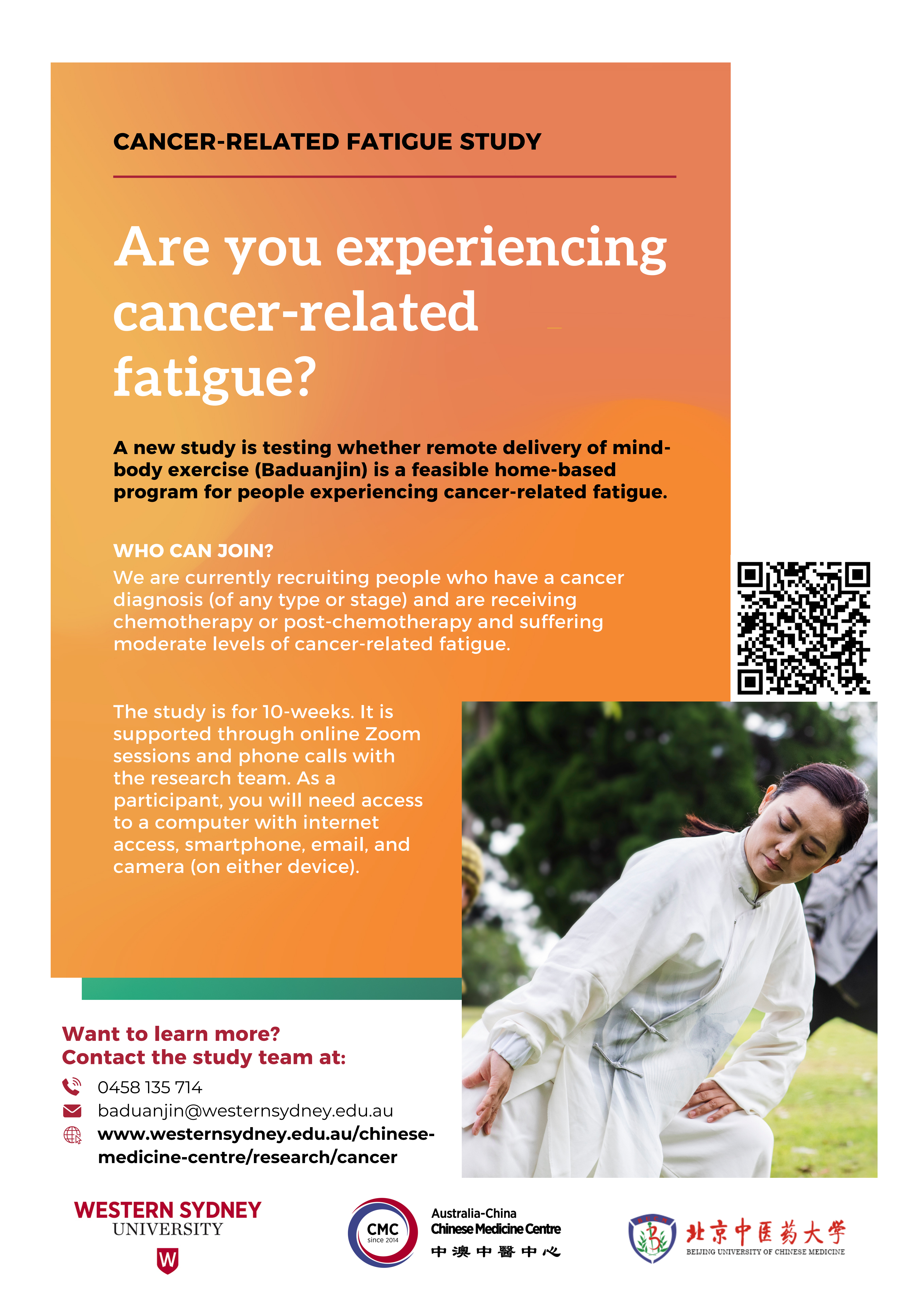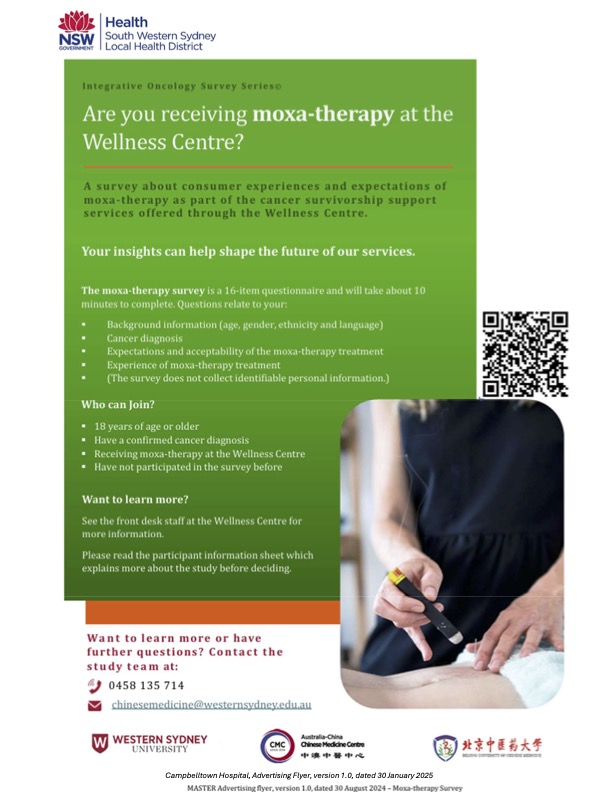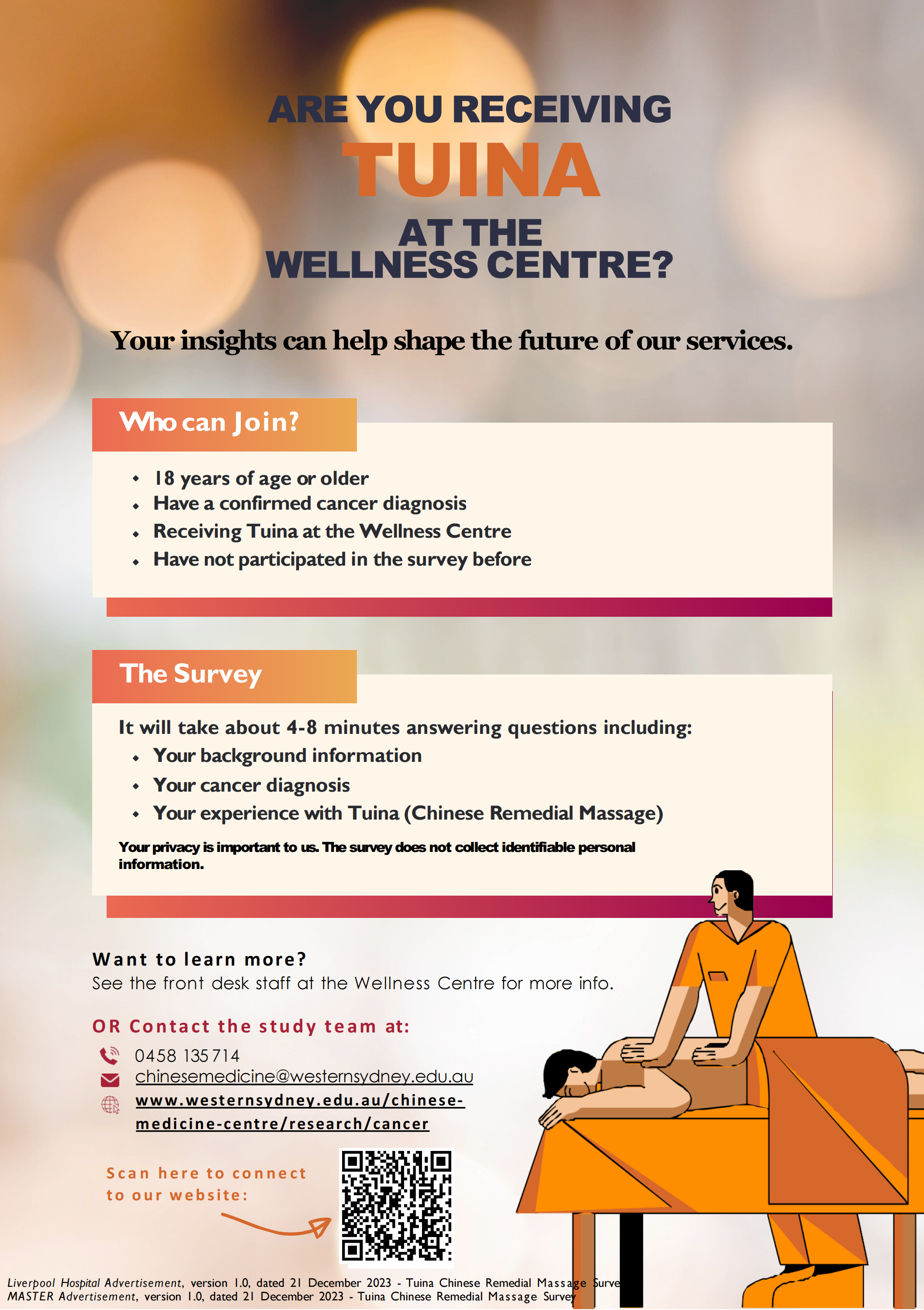You can search for courses, events, people, and anything else.
Current cancer-focused research projects
Baduanjin Mind-body exercise for cancer-related fatigue: a feasibility study.
A new study is testing whether remote delivery of mind-body exercise (Baduanjin) is a feasible home-based program for people experiencing cancer-related fatigue.
What is Baduanjin?
Baduanjin is a mind-body exercise like Tai chi. It involves a set of eight gentle exercises coordinating physical movement with focusing the mind and controlled breathing patterns. It is a low impact and low intensity intervention to assist people who cannot otherwise participate in standardised exercise interventions and can be undertaken at home or any location of a person’s choosing.
What is cancer-related fatigue?
Cancer-related fatigue is a persistent, subjective sense of physical, emotional and/or cognitive tiredness or exhaustion related to cancer or cancer treatment, and which interferes with a person’s everyday usual functioning in life. It is a fatigue that is less likely to be relieved by rest or sleep. It can affect a person’s quality of life. Studies have shown that low-intensity to moderate mind-body exercise of various forms can help relieve the severity and persistence of cancer-related fatigue. This study will help understand the acceptability of this exercise for people with cancer-related fatigue.
Baduanjin Mind-body exercise for cancer-related fatigue: a feasibility study
Cancer-related fatigue (CRF) is commonly reported among individuals living with a cancer diagnosis. Baduanjin, the most widely practiced mind-body exercise in China, holds promise for mitigating fatigue. The primary objective of this study is to evaluate the feasibility and acceptability of a remotely delivered (via Zoom software) Baduanjin mind-body exercise program through a randomized controlled trial. The program targets participants diagnosed with any type and stage of cancer, currently undergoing or having completed chemotherapy, and experiencing CRF. The protocol has been published in "Baduanjin Mind-Body Exercise for Cancer-Related Fatigue: Protocol for a Remotely Delivered Randomized Wait-List Controlled Feasibility Study"
For further information, please contact our researcher on 0458 135 714 or email ChineseMedicine@westernsydney.edu.au
Moxa-therapy survey: public hospital cancer survivorship outpatient services at the SWSLHD Cancer Wellness Centre
Towards shaping the future of integrative oncology services in partnership with and for consumers
Cancer survivorship is a critical aspect of cancer care, and support services play a crucial role in improving patient’s (as consumers) quality of life. However, there may be unique challenges in accessing support services to meet personal, and community needs, and which authentically reflect the diverse expectations of consumers. This is especially the case in the South West Sydney Local Health District (SWSLHD) catchment area which includes people with complex health needs. It is also home to one of the largest culturally and linguistically diverse (CALD) populations in Australia.
Moxa-therapy is a unique support service being offered through the SWSLHD Cancer Wellness Centre through the Liverpool Hospital, Campbelltown Hospital and Fairfield Hospital. The service represents a significant integrative oncology component of complementary medicine which can be tailored to support consumers treatment preferences and their expectations of supportive care services.
The study involves a 16-item survey with 8 questions completed before treatment and 8 questions after treatment. The study’s primary objective is to explore the expectations of consumers, including people identifying as belonging to a CALD community, and the acceptability of the service as part of the cancer survivorship support services and whether their expectations are being met by these services. The secondary objectives are to identify feasibility gaps in the services being provided and potential areas for strengthening.
For further information, please contact our study team on 0458 135 714 or email ChineseMedicine@westernsydney.edu.au.
Do current Tuina Chinese Remedial Massage (CRM) services meet the needs of Culturally and Linguistically Diverse (CALD) communities’ expectations for cancer survivorship
Case study of health-related determination at the Cancer Wellness Centre
Cancer survivorship is a critical aspect of cancer care, and support services play a crucial role in improving patient’s quality of life. However, there may be unique challenges in accessing support services that meet personal and community needs for people from culturally and linguistically diverse (CALD) populations. The South West Sydney Local Health District (SWSLHD) catchment area includes people with complex health needs, and it also has one of the largest CALD populations in Australia.
Tuina (Chinese Remedial Massage) services offered through the SWSLHD Wellness Centre (Liverpool Hospital) therefore represents a significant component of complementary medicine that could meet the unique needs of CALD cancer survivors by providing culturally sensitive support tailored to their preferences and experiences, (as well as anyone who seeks additional support for symptom management).
The primary objective of this study is to examine the expectations of patients, including people identifying as belonging to a CALD community, and who are receiving Tuina CRM for cancer survivorship support services provided at the Cancer Wellness Centres. The secondary objectives are to identify any gaps in the services being provided.
For further information, please contact our study team on 0458 135 714 or email ChineseMedicine@westernsydney.edu.au.
A clinical trial in Acupuncture for cancer-related pain
Recruitment for this study has now finished and is closed to new participants. The data is currently being analysed and results will be reported soon.
This study investigates whether acupuncture can help the management of cancer-related pain. Results from various global clinical trials suggest a promising impact on cancer-related pain relief.
Potential participants will be recruited from Cancer Wellness Centre, Liverpool Hospital and Macarthur Cancer Therapy Centre, Campbelltown Hospital.
Who can join?
- Men and women 18 years old and older.
- Participants who have been diagnosed with cancer-related pain, provided by an oncologist of Liverpool hospital, regardless of the cancer type, stage or the presence of metastasis.
- Included types of pain: somatic nociceptive pain, visceral nociceptive pain, neuropathic pain and mixed types of pain.
- Participants with Numerical Rating Scale (NRS) score > 3.
- Participants willing and able to give consent.
What's involved?
This study is a pragmatic randomised controlled trial. Participants are randomly assigned into the acupuncture study intervention group or wait list control group. The wait list control group serves as an untreated comparison group during the study, but eventually goes on to receive the intervention after waiting 4 weeks. Participants receive the intervention twice a week for 4 weeks, a total of 8 interventions. After completing the last intervention session, participants will complete a 4-week follow-up, a total of 12 weeks is the trial period.
For further information, please contact our researcher on 0458 135 714 or email ChineseMedicine@westernsydney.edu.au
Guo Lin mind-body exercise for quality of life in patients with cancer
This study employs a mixed-method approach, combining a randomised controlled trial and semi-structured interviews, to investigate the feasibility and effects of Guolin Qigong (GQ) on cancer-related fatigue and its associated symptoms in breast, lung, and colorectal cancer survivors. A total of 60 participants are recruited and divided into two study groups in a 1:1 ratio. The intervention group undergoes a 12-week GQ intervention, followed by a four-week follow-up period (Week 16), while the control group receives usual care on a waitlist. Semi-structured interviews, based on purposive sampling, are conducted at the end of Week 16 for each cohort. This trial has closed for recruitment.
For further information, please contact our researcher on 0458 135 714 or email ChineseMedicine@westernsydney.edu.au
Developing an evidence-based expert consensus statement for building protocol content of clinical trials in TCM modalities for integrative cancer care
This study aims to develop an evidence-based expert consensus statement for establishing protocol content in clinical trials involving Traditional Chinese Medicine (TCM) modalities for integrative cancer care. It involves two online surveys: the first identifies key and essential elements for TCM intervention protocols in cancer care, while the second focuses on refining the consensus from the first survey. The content and direction of the second survey are informed by the initial survey's results. The study intends to provide valuable guidance to investigators in designing high-quality clinical trials in the field of TCM for cancer care. Relevant results have been published in "Are Published Cancer Care Trial Protocols with Traditional Chinese Medicine Interventions Concordant with SPIRIT-TCM Extension 2018? A Scoping Review on Published Trial Protocols Between 2019 and 2022"











